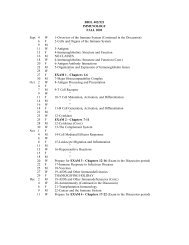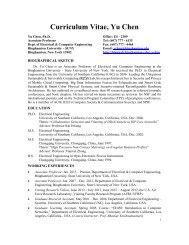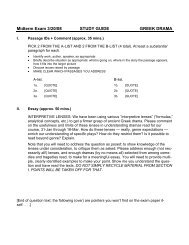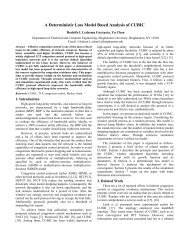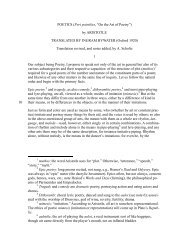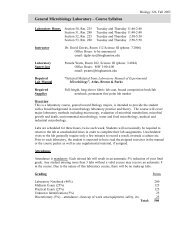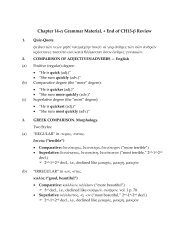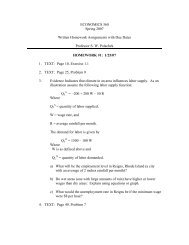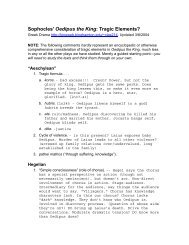WORLD POVERTY AND INDIVIDUAL FREEDOM - Harvey
WORLD POVERTY AND INDIVIDUAL FREEDOM - Harvey
WORLD POVERTY AND INDIVIDUAL FREEDOM - Harvey
You also want an ePaper? Increase the reach of your titles
YUMPU automatically turns print PDFs into web optimized ePapers that Google loves.
American Philosophical Quarterly<br />
Volume 45, Number 2, April 2008<br />
<strong>WORLD</strong> <strong>POVERTY</strong><br />
<strong>AND</strong> <strong>INDIVIDUAL</strong> <strong>FREEDOM</strong><br />
Most people know that the extent of<br />
world poverty is staggering. 1 Many do not<br />
believe that we are obligated to do anything<br />
about it. Often those who resist the idea that<br />
we are obligated to help the global poor are<br />
concerned about the freedom of individuals<br />
to live their lives. They believe that no one<br />
should be required to sacrifi ce her freedom<br />
for another person. This paper argues that it is<br />
precisely because no one should be required<br />
to sacrifi ce her freedom for others that we<br />
have a prima facie obligation to enable all<br />
people to meet their basic needs. It defends<br />
each premise of what we can call the Argument<br />
from Autonomy in turn.<br />
The Argument from Autonomy might be<br />
summarized roughly as follows:<br />
1) There is a coercive global institutional<br />
system.<br />
2) Because this system deeply impacts<br />
the lives of individuals and communities<br />
in morally signifi cant ways,<br />
we are obligated to ensure that it is<br />
legitimate.<br />
3) For any coercive institutional system<br />
to be even minimally legitimate, as<br />
many of those subject to the system<br />
Nicole Hassoun<br />
191<br />
as possible must be able to autonomously<br />
agree to live under it.<br />
4) For most people to be able to autonomously<br />
agree to live under an<br />
institutional system, they must be<br />
able to preserve the integrity of their<br />
body and mind.<br />
5) Since it is not possible to tell which<br />
individuals will be capable of autonomously<br />
agreeing to live under<br />
an institutional system without being<br />
able to preserve this integrity,<br />
legitimate institutional systems must<br />
enable all of their subjects to do so.<br />
6) The ability to preserve the integrity<br />
of one’s body and mind requires<br />
that one is able to meet one’s basic<br />
needs.<br />
C) So we are, prima facie, obligated to<br />
ensure that the global institutional<br />
system enables all people to meet<br />
their basic needs. 2<br />
Let us now turn to the defense of this argument.
192 / AMERICAN PHILOSOPHICAL QUARTERLY<br />
1. The First and Second Premises<br />
of the Argument from Autonomy<br />
Let us say that an institution is an entity<br />
that creates, enforces, or arbitrates between<br />
norms, rules, or procedures governing interaction<br />
between social orders or individuals (Buchanan<br />
1990, p. 2). 3 A group of institutions,<br />
in combination with the rules that support<br />
and constrain them, constitute an institutional<br />
system. Institutions and rules coercively constrain<br />
the actions of individuals or groups<br />
when those violating their dictates are likely<br />
to face sanctions for the violation. 4<br />
Global markets, bodies of governance<br />
(like the U.N.), and legal institutions (like<br />
the World Court) are part of the global institutional<br />
system. These institutions and rules<br />
coercively constrain individuals’ actions.<br />
Global markets, for example, rely on there being<br />
an enforceable system of property rights<br />
and rules of trade. Institutions like the World<br />
Trade Organization (WTO), in combination<br />
with national governments, enforce these<br />
rules. When an institutional system contains<br />
many coercive institutions or rules, we can<br />
say that the system is coercive. There is, thus,<br />
a coercive global institutional system. This<br />
is the fi rst premise of the Argument from<br />
Autonomy. 5<br />
The second premise of the Argument from<br />
Autonomy asserts that we have an obligation<br />
to ensure that the global institutional system<br />
is legitimate because it deeply impacts the<br />
lives of individuals and communities. International<br />
institutions not only “refl ect, but<br />
also actively shape communities” (Hurrell<br />
2001, p. 37). The character of a community<br />
is formed in part by the social and political<br />
institutions of that community. For example,<br />
communities under global communism would<br />
probably be very different from communities<br />
under global capitalism. Global institutions,<br />
like national institutions, also shape in a<br />
fundamental way the character and aims of<br />
every individual, “the kinds of persons they<br />
are and aspire to be” (Rawls 1993, p. 68).<br />
Each choice of basic institutional structure<br />
will favor some natural talents over others.<br />
One’s ability to contribute to a scheme of<br />
social cooperation at all depends on what<br />
cooperative framework is in place (Buchanan<br />
1990, p. 237). Because of these impacts, we<br />
are obligated to make sure that the global<br />
institutional system is legitimate. 6<br />
2. The Third Premise of the<br />
Argument from Autonomy<br />
Many things might be required for legitimacy.<br />
At a minimum, as many of those subject<br />
to the rules of an institutional system as<br />
possible must be able to autonomously agree<br />
to those rules, for the system to be legitimate.<br />
Institutional legitimacy does not require that<br />
everyone subject to an institutional system be<br />
capable of autonomy because some people<br />
could not be autonomous under any system.<br />
People in permanent comas and small children,<br />
for example, could not be autonomous<br />
no matter how their institutional systems<br />
were structured. 7 Nor does legitimacy require<br />
that autonomous agreement be reachable in<br />
practice. It may be impossible to ask all individuals<br />
whether or not they agree to the rules<br />
of the global institutional system. Rather, a<br />
legitimate system need only be one to which<br />
all its subjects are able to agree, if they could<br />
be autonomous under some implementable<br />
institutional system. 8 This is the third premise<br />
of the Argument from Autonomy.<br />
This criterion for institutional legitimacy<br />
is recognizably contractualist. It is similar to<br />
Rawls’s liberal principle of legitimacy and<br />
Kant’s idea of the original contract. Rawls believes<br />
that the basic structure of society must<br />
be such that people could rationally agree to<br />
it (Rawls 1993, p. 137). Kant argues that the<br />
basic law or original contract “can come only<br />
from the general, united will of the people”<br />
(Kant 1990, part II). He continues: “[I]f the<br />
law is such that a whole people could not pos-
sibly agree to it . . . it is unjust; but if it is at<br />
least possible that a people could agree to it,<br />
it is our duty to consider the law as just, even<br />
if the people is at present in such a position or<br />
attitude of mind that it would probably refuse<br />
its consent if it were consulted” (Kant 1990,<br />
part II). This is what allows people to retain<br />
their freedom and exercise their autonomy.<br />
Some of the ways that the criterion for<br />
institutional legitimacy advanced here differs<br />
from Rawls’s and Kant’s principles are worth<br />
emphasizing. For example, it is obvious, but<br />
important to note, that our criterion for institutional<br />
legitimacy, unlike Kant and Rawls’s<br />
criteria, has global scope. Furthermore, our<br />
criterion may require more than Rawls’s<br />
criterion for legitimacy. On our criterion,<br />
whether or not people are asked to agree to<br />
an institutional system, as many of those subject<br />
to the system as possible must be able to<br />
autonomously agree to it. If Rawls’s principle<br />
is interpreted in a way consistent with the<br />
original position argument, an institutional<br />
system may merely need to be structured<br />
so that it warrants agreement. It is not clear<br />
that the people need to be capable of freely<br />
agreeing to an institutional system on Rawls’s<br />
theory even if they are asked. Finally, unlike<br />
Kant’s criterion for institutional legitimacy,<br />
our criterion does not say that subjects’<br />
ability to agree to an institutional system is<br />
suffi cient for legitimacy. 9 It is only necessary<br />
that an institutional system be structured so<br />
that as many people as possible are able to<br />
freely agree to that system. Though, one could<br />
add the suffi ciency claim to the criterion for<br />
institutional legitimacy advanced here if one<br />
believes it is plausible. 10<br />
3. The Final Premises and the<br />
Conclusion of the<br />
Argument from Autonomy<br />
Individuals subject to the force of the<br />
global institutional system must be able to<br />
secure autonomy in order for the global in-<br />
<strong>WORLD</strong> <strong>POVERTY</strong> <strong>AND</strong> <strong>INDIVIDUAL</strong> <strong>FREEDOM</strong> / 193<br />
stitutional system to be legitimate. 11 Because<br />
there are many ways of trying to account<br />
for the kind of autonomy at issue, we must<br />
consider some criteria for theory choice. We<br />
can start with a few criteria suggested in the<br />
literature on autonomy. Gerald Dworkin,<br />
for example, holds that a good theory of autonomy<br />
should be logically consistent, and<br />
empirically possible. Onora O’Neill claims<br />
that a good theory should explain why physically<br />
unconstrained people who are coerced,<br />
compelled, or manipulated as well as those<br />
in chains lack autonomy. O’Neill also holds<br />
that autonomy should be compatible with the<br />
values of interdependence and care that many<br />
feminists and communitarians extol (O’Neill<br />
2000, p. 30).<br />
Finally, a good theory of autonomy must<br />
avoid the “regress problem” to which Harry<br />
Frankfurt and Gerald Dworkin’s “higher-order”<br />
theories of autonomy are subject (Wolf<br />
1989). Frankfurt and Dworkin claim that, to<br />
be autonomous, one must endorse the beliefs,<br />
desires, goals, and values that one has (henceforth<br />
“desires”). This endorsement must not<br />
be alien to the individual (Dworkin 1989, p.<br />
61). But what happens if, at a higher level,<br />
one rejects one’s second-order desires (the<br />
desires that affi rm one’s fi rst order desires)?<br />
In this case, it seems that one’s fi rst order<br />
desires can not be autonomous. Unfortunately,<br />
it is not plausible to claim that one’s<br />
endorsement itself must always be endorsed.<br />
It is psychologically impossible for a single<br />
person to have an infi nite number of desires.<br />
Nor can Dworkin or Frankfurt respond that<br />
one’s highest level desires must just endorse<br />
the desires one level down. For, then, someone<br />
might ask: Why is this endorsement itself<br />
rationally justifi ed?<br />
One theory of autonomy that sidesteps the<br />
regress problem and fulfi lls the above criteria<br />
might be called the rationality theory of autonomy.<br />
The rationality theory holds that the<br />
majority of one’s desires must be the result<br />
of deliberation and that at least the general
194 / AMERICAN PHILOSOPHICAL QUARTERLY<br />
structure of one’s desires must be sanctioned<br />
by reason (i.e., justifi ed). To be autonomous,<br />
one must be a genuinely refl ective person<br />
who has some degree of success in organizing<br />
one’s desires. Otherwise, one may be<br />
constantly suffering from weakness of will<br />
or torn apart by inner confl ict. To see why<br />
this is required, consider the case of Tamil.<br />
Tamil wants to be a teacher. She is committed<br />
to doing whatever it takes to teach in the<br />
local school. She also wants to watch TV<br />
twenty-four hours a day. She has not thought<br />
about these desires and ranked them in order<br />
of importance. Perhaps she will not be able to<br />
decide what to do. Perhaps she will spend her<br />
time going back and forth between her books<br />
and her television. No matter what she does,<br />
she will have reason to regret her decision.<br />
Her desires are like cars on city streets going<br />
this way and that but she lacks any traffi c<br />
signals (Feinberg 1973, pp. 14–15). She lacks<br />
rules with which she can direct her desires.<br />
Tamil is not autonomous.<br />
Of course, neither perfect coherence nor<br />
complete endorsement of all of the details of<br />
the structure of one’s desires is required for<br />
autonomy. That would be empirically unrealistic.<br />
Furthermore, such a requirement would<br />
not buy one much: One could be hypnotized<br />
to have a perfectly coherent set of desires.<br />
One could be brainwashed to endorse all<br />
of one’s desires, as well as the structure of<br />
one’s desires.<br />
One does not even need to consciously<br />
refl ect on all of one’s desires in order to<br />
be autonomous. Some desires of even the<br />
most autonomous people are not even conscious,<br />
never mind sanctioned by reason.<br />
For example, some trivial desires to smile<br />
or use the bathroom may not be the subject<br />
of refl ection. Such desires do not need to be<br />
justifi ed for one to be autonomous. Rather,<br />
they must merely be confi rmable by reason;<br />
were they considered they would be found<br />
to be justifi ed.<br />
Even some of one’s important desires do<br />
not need to be considered by reason for one<br />
to be autonomous. Such desires are foundational.<br />
They are central constituents of one’s<br />
self. The self is composed of “basic cognitive<br />
organizing principles and fundamental<br />
assumptions and convictions together with<br />
the desires that constitute [one’s] . . . deepest,<br />
most signifi cant goals, concerns, commitments<br />
and values” (Noggle 2005, p. 101).<br />
Presumably, many foundational desires are<br />
desires for the objects of one’s basic needs.<br />
Other plausible candidates are desires for<br />
things which bring purpose to one’s life.<br />
Even if some desires were originally given<br />
to one by an outside source, one might still be<br />
free with respect to those desires if they have<br />
become integrated into one’s self (Christman<br />
1989, Watson 1989). One might test whether<br />
any given desire is integrated by considering<br />
how one would feel if one acted on that desire.<br />
Would one’s having acted on the desire just<br />
be one’s acting (Christman 1989)? Feeling<br />
a sense of whole-heartedness in expressing<br />
the desire is, at least, indicative of its foundational<br />
status.<br />
Affi rmed foundational desires are those to<br />
which other desires must normally cohere<br />
(Noggle 2005, p. 101). They are used to justify<br />
other desires or would be so used if the<br />
process of justifi cation were embarked upon<br />
and continued for long enough. Foundational<br />
desires are important to autonomy because<br />
there is no way one could be hypnotized to<br />
have such desires. 12<br />
Autonomy, on the rationality theory, will<br />
not “confl ict with emotional ties to others,<br />
with commitments to causes, with authority,<br />
tradition, expertise, leadership, and so forth”<br />
(Dworkin 1989, p. 59). Nor are the values<br />
of community, care, and interdependence<br />
in tension with such reasoned evaluation.<br />
One might reasonably accept the example<br />
or traditions that one’s culture, parents, role<br />
models, or leaders have provided, perhaps<br />
on the basis of one’s emotional ties or com-
mitments to these traditions or individuals.<br />
Alternately, such beliefs may form the evaluative<br />
framework of desires with which one<br />
identifi es. They may be foundational. Though<br />
we should not let some emotions (e.g., deadly<br />
rage) infl uence our actions, we must take our<br />
emotions into account to live autonomously. 13<br />
It is important to take emotions into account<br />
in order to attain the peace of mind necessary<br />
for really having a life at all. 14<br />
In fact, for most people to do much of<br />
anything other than think about the state of<br />
their stomach, they must be fed. In order to<br />
do much, besides worry about survival, most<br />
people must have shelter and bodily integrity.<br />
The radically poor are likely to lack such<br />
things. They are likely to suffer from disabilities<br />
like frequent sickness and malnutrition.<br />
These disabilities can prevent normal<br />
development and clear reasoning and thus<br />
function as road blocks to autonomy. 15<br />
Those without elementary education and a<br />
diversity of experience may not gain the tools<br />
necessary for avoiding such disabilities. They<br />
may be unable to develop the skills and status<br />
they require to gain employment, receive<br />
loans, and get assistance in times of need.<br />
Radically poor children often lack access to<br />
decent education and broad experience. They<br />
are likely to be kept home from school to<br />
work. They may, thus, be unable to keep up<br />
with their peers or fail to learn well. Because<br />
they are often hungry and ill, the radically<br />
poor can have trouble learning well even<br />
when they do get a basic education and broad<br />
experience. Their ability to live autonomous<br />
lives is correspondingly threatened.<br />
Furthermore, some disabilities can engender<br />
others. Without the money to pay for<br />
education, parents may not be able to send<br />
their children to school. Families may have<br />
to sacrifi ce food and essential medicines to<br />
pay for education or shelter. They may have<br />
to sacrifi ce education or shelter for food and<br />
essential medicines. If fewer of their basic<br />
needs are met, the chance that the radically<br />
<strong>WORLD</strong> <strong>POVERTY</strong> <strong>AND</strong> <strong>INDIVIDUAL</strong> <strong>FREEDOM</strong> / 195<br />
poor will be disabled is greater. Their ability<br />
to lead autonomous lives may be imperiled.<br />
When bodily integrity is threatened, mental<br />
and emotional integrity may be threatened<br />
as well. Even when the radically poor are<br />
not disabled, the fear of becoming disabled<br />
may itself interfere with individuals’ ability<br />
to live autonomous lives. In order for most<br />
people to think with clarity about the future,<br />
to pursue anything beyond their next meal,<br />
they must be confi dent that they can preserve<br />
the integrity of their bodies and minds. Most<br />
people must be able to attain the objects of<br />
their basic needs in order to be capable of<br />
living autonomously. 16 As Nietzsche said,<br />
“the belly is the reason why man does not so<br />
readily take himself for a God” (Nietzsche<br />
1989, p. 96).<br />
Finally, poverty can threaten self-esteem.<br />
Poor people sometimes start to think badly<br />
of themselves just because they are poor,<br />
unskilled, or disparaged by others. If one<br />
thinks that one is worthless, one may fail to<br />
give one’s desires due weight. One might look<br />
to supplicate oneself to other (richer) people<br />
in the hopes of attaining sustenance (as beggars<br />
do). In supplicating one’s self, one may<br />
be unable to live autonomously apart from<br />
the desires of others. It is often the case that<br />
“without minimal standards of subsistence,<br />
agency itself fails” (O’Neill 2000, p. 134).<br />
Those who are incapable of autonomy may<br />
fail to have a life of their own. Legitimate<br />
institutions must provide safeguards against<br />
such possibilities.<br />
Of course, I do not mean to claim that all<br />
radically poor people are ruled by their stomachs,<br />
incapable of reason, subject to the will<br />
of others, or unable to consent to institutional<br />
rule. Nonetheless, it is important to take seriously<br />
how an individual’s ability to develop<br />
and maintain autonomy can be undermined<br />
by severe deprivation (O’Neill 2000, p. 167).<br />
Some people are able to secure autonomy<br />
without being able to preserve the integrity<br />
of their body and mind; without being able
196 / AMERICAN PHILOSOPHICAL QUARTERLY<br />
to meet their basic needs. Nonetheless, when<br />
they are malnourished and in poor health, it is<br />
not psychologically possible for most people<br />
to do so. We cannot tell ahead of time who<br />
will be able to secure autonomy without being<br />
able to preserve the integrity of their body and<br />
mind, without being able to meet their basic<br />
needs. So we are, prima facie, obligated to<br />
NOTES<br />
implement a global institutional system that<br />
enables all people to meet their basic needs.<br />
As Ghandi’s Talisman says, we should work<br />
to enable the poor to control their own lives<br />
and destinies; we should secure “‘swaraj’<br />
or self-rule for the hungry” (Pyarelal 1958,<br />
p. 65).<br />
Carnegie Mellon University<br />
1. The author would like to thank Thomas Christiano, Gillian Brock, Michael Gill, Jerry Gaus,<br />
Thomas Pogge, Allen Buchanan, J. Neil Bearden, Sally Scholtz, David Copp, James Sterba, Thomas<br />
Hill, Pilvi Toppinen, Rick Furtak, Paul Boghossian, Chris Kelley, Susan Wolf, and Keith Lehrer for<br />
taking the time to talk with me about previous drafts of this paper. She would also like to thank audiences<br />
at the American Philosophical Association Pacifi c Division meeting, the University of Chicago<br />
Loyola Graduate Student Conference in Philosophy, the 32nd Conference on Value Inquiry at Tulane,<br />
the University of Arizona, and the University of North Carolina Chapel Hill, at which one or another<br />
version of this paper was presented. Finally, she is terribly grateful for the support she received from<br />
the American Association of University Women and the Earhart Foundation during the course of the<br />
project. She extends her apologies to anyone she has so carelessly forgotten to mention.<br />
2. While it is probably strictly impossible to make anyone autonomous, institutions can be structured<br />
such that they enable people to develop autonomy. Institutional systems must at least provide one way for<br />
everyone to attain the material conditions for autonomy (e.g., food, water, and basic medical care). Teachers<br />
and parents surely do much more than this, and yet, we believe that some people raised by parents and<br />
educated by teachers can be autonomous. In fact, it is probably not enough for institutional systems to keep<br />
open only one avenue by which individuals can meet their basic needs. Those who are hungry will often<br />
do whatever is necessary to get food. If they are not able to get food in a legitimate way, they will often<br />
turn to crime, terrorism, or other unethical means of attaining sustenance. In order for institutional systems<br />
to be legitimate, they must enable all of their subjects to become autonomous in a legitimate way.<br />
3. The institutions I am concerned with are embodied in formal organizations and are part of a comprehensive<br />
social system (akin to John Rawls’s basic structure). A comprehensive social system is a<br />
legal, political, or economic system that governs the distribution of fundamental duties and rights,<br />
advantages and disadvantages that result from social interaction (Rawls 1993; Pogge 1989). I do not<br />
intend the term institution to refer to entities like the American Tennis Association.<br />
4. See Hassoun 2008a, 2008b for further discussion.<br />
5. The author defends the fi rst few premises of the Argument from Autonomy at some length elsewhere.<br />
See, for instance, Hassoun, 2008a, 2008b.<br />
6. Who is responsible for bringing about the requisite institutional changes will depend, in part, on<br />
what changes are required. At a general level we might say that the relatively affl uent members of the<br />
world’s population who inaugurate, uphold, or are in a position to change the global institutional system<br />
are responsible for doing so. Further discussion of responsibility is beyond the scope of this paper.<br />
Interested readers can see Pogge 1989, 2002.<br />
7. Some of those in comas might recover with good medical care. A legitimate institutional system must<br />
enable these people to become autonomous enough to agree to the system. Similarly, most children who
<strong>WORLD</strong> <strong>POVERTY</strong> <strong>AND</strong> <strong>INDIVIDUAL</strong> <strong>FREEDOM</strong> / 197<br />
receive proper care will be able to autonomously agree to an institutional system as they get older. Any<br />
legitimate institutional system must secure this ability for these children when they are old enough.<br />
8. There are at least two reasons, beyond the value of the ability to autonomously consent, that this<br />
might be the case. First, the ability to secure autonomy has intrinsic value. Second, the ability to secure<br />
autonomy has instrumental value. Individuals need to have this ability in order to create and maintain a<br />
view of the good life. Individuals must be able to create and maintain a view of the good life in order to<br />
develop and exercise their talents, to live a worthwhile life (Feinberg 1989, p. 48). For further defense<br />
of this premise also see Hassoun 2008a.<br />
9. Other conditions may need to be satisfi ed for an institutional system to be legitimate. If there are<br />
other conditions, questions arise about how to satisfy different principles for legitimacy. Further inquiry<br />
into these matters must be left for another time, however.<br />
10. One might worry that even the kind of theory we have given is too demanding. There are two things<br />
to say on this account. First, the principles that individuals must be able to accept may be disjoint. We<br />
might follow Kant in holding that the principles can be agreed to in a piece-meal fashion. Agreement<br />
may only need to be possible with respect to coercive laws rather than to the whole structure of the<br />
global institutional system. Alternately, we might require only that individuals are able to agree to the<br />
general structure of the system. They need not be able to agree to the whole system. Unfortunately,<br />
consideration of such possibilities starts to take us far afi eld. The interested reader can refer to Kant<br />
and Rawls’s discussions which are relevant to this issue. See Kant 1973, Rawls 1993.<br />
11. Autonomy probably comes in degrees but, because it is easier to talk of autonomy simpliciter, we<br />
can use this locution. The reader should keep in mind the fact that we are concerned here only with<br />
autonomy suffi cient to allow free agreement to institutional systems.<br />
12. One’s foundational desires might change over time. Desires that were originally foundational might<br />
lose their foundational status. If such desires could not then be rationally justifi ed, and one continued to<br />
act on them, one would lose some of one’s autonomy. Such desires are no longer part of one’s true self.<br />
13. Of course, nothing we have said precludes people from being autonomous but immoral.<br />
14. See Rachels and Ruddick 1989 for defense of the idea that autonomy is constitutive of having a life.<br />
15. Because autonomous consent requires even more than autonomy simpliciter, the radically poor may<br />
be even less able to agree to a global institutional system. If they lack education, for instance, they may<br />
not even know about the existence of global institutions.<br />
16. Harder questions about what autonomy requires are considered by Joseph Raz in The Morality of<br />
Freedom. He considers the case of a man trapped in a pit with enough food and water to survive. The<br />
man is precluded from doing anything besides choosing when to meet his basic needs. It would be<br />
reasonable to think that with such constrained options such a person is not autonomous, but even if one<br />
does not accept this much, the Argument from Autonomy may still go through. Raz’s hounded woman<br />
who is trapped on an island and must constantly avoid being killed by a hungry carnivorous animal<br />
would, however, probably lack autonomy on the rationality theory. Her mind may be so pre-occupied<br />
that she would lack even the ability for minimal endorsement of her desires (Raz 1998, chap. 14).<br />
REFERENCES<br />
Beitz, Charles. 1979. Political Theory and International Relations. Princeton, N.J.: Princeton University<br />
Press.<br />
Berlin, Isaiah. 1991. “Two Concepts of Liberty,” in Liberty, ed. David Miller (Oxford: Oxford University<br />
Press).
198 / AMERICAN PHILOSOPHICAL QUARTERLY<br />
Brock, Gillian. 1998. Necessary Goods: Our Responsibilities to Meet Others’ Needs Lanham, Md.:<br />
Rowman and Littlefi eld Publishers, Inc.).<br />
Buchanan, Allen. 1990. “Justice as Reciprocity vs. Subject-Centered Justice,” in Philosophy and Public<br />
Affairs, vol. 19, pp. 227–252.<br />
Caney, Simon. 2002. “Survey Article: Cosmopolitanism and the Law of Peoples,” in The Journal of<br />
Political Philosophy, vol. 10, no. 1, pp. 95–133.<br />
Christman, John, ed. 1989a. The Inner Citadel: Essays on Autonomy (Oxford: Oxford University Press).<br />
. 1989b. “Introduction,” in Christman 1989a.<br />
Dworkin, Gerald, 1989. “The Concept of Autonomy,” in Christman 1989a.<br />
Feinberg, Joel. 1973. Social Philosophy (Upper Saddle River, N.J.: Prentice Hall, Inc.).<br />
. 1989. “Autonomy,” in Christman 1989a.<br />
Frankfurt, Harry. 1989. “Freedom of the Will and the Concept of a Person,” in Christman 1989a.<br />
Hassoun, Nicole. 2008a. “Freedom and Autonomy.” Carnegie Mellon University Working Paper. Available<br />
at http://www.hss.cmu.edu/philosophy/faculty-hassoun.php.<br />
. 2008b. “Why Libertarians Should Be Actual Consent Theorists.” Carnegie Mellon University<br />
Working Paper. Available at: http://www.hss.cmu.edu/philosophy/faculty-hassoun.php.<br />
Hill, Thomas E., Jr. 1989. “The Kantian Conception of Autonomy,” in Christman 1989a.<br />
Hurrell, Andrew. 2001. “Global Inequality and International Institutions,” in Global Justice, ed. Thomas<br />
Pogge; Meta-Philosophy Series in Philosophy, ed. A. T. Maroobian and Brian Huschle (Oxford:<br />
Blackwell Publishing).<br />
Kant, Immanuel 1990. “Theory and Practice,” in Kant’s Political Writings, ed. H. Reiss, trans. H. B.<br />
Nisbet (Cambridge: Cambridge University Press).<br />
Nietzsche, Friedrich. 1989. Beyond Good and Evil, trans. Hellen Zimmern (New York: Prometheus<br />
Books).<br />
Noggle, Robert. 2005. “Autonomy and the Paradox of Self-Creation,” in Personal Autonomy: New Essays<br />
on Personal Autonomy and its Role in Contemporary Moral Philosophy, ed. James Stacy Taylor<br />
(Cambridge: Cambridge University Press).<br />
Nozick, Robert. 1974. Anarchy, State, and Utopia (New York: Basic Books).<br />
Nussbaum, Martha. 2000. Women and Human Development: The Capabilities Approach (Cambridge:<br />
Cambridge University Press).<br />
O’Neill, Onora. 2000. Bounds of Justice (Cambridge: Cambridge University Press).<br />
Pogge, Thomas. 1989. Realizing Rawls (Ithaca, N.Y.: Cornell University Press).<br />
. 2002. World Poverty and Human Rights: Cosmopolitan Responsibilities and Reforms (Cambridge:<br />
Polity Press).<br />
. 2005. “Severe Poverty as a Human Rights Violation,” in Freedom from Poverty as a Human<br />
Right: Who Owes What to the Very Poor? ed. Thomas Pogge (Oxford: Oxford University Press).<br />
Pyarelal, Nair. 1958. Mahatma Gandhi: The Last Phase vol. 2 (Ahmedabad, India: Navajivan Press).<br />
Rachels, James, and William Ruddick. 1989. “Lives and Liberty,” in Christman 1989.<br />
Rawls, John. 1971. A Theory of Justice (Cambridge, Mass.: Belknap Press).<br />
. 1993. Political Liberalism (New York: Columbia University Press).<br />
. 1999. Law of Peoples Cambridge, Mass.: Harvard University Press).<br />
Raz, Joseph. 1998. The Morality of Freedom (Oxford: Clarendon Press).<br />
Shue, Henry. 1980. Basic Rights: Subsistence, Affl uence, and U.S. Foreign Policy (Princeton, N.J.:<br />
Princeton University Press).<br />
Singer, Peter. 2002. “Famine, Affl uence, and Morality,” in Environmental Ethics: What Really Matters,<br />
What Really Works, ed. David Schmidtz and Elizabeth Willott (Oxford: Oxford University Press).<br />
Watson, Gary. 1989. “Free Agency,” in Christman 1989.<br />
Wolf, Susan. 1989. “Sanity and the Metaphysics of Responsibility,” in Christman 1989.<br />
. 1990. Freedom within Reason (Oxford: Oxford University Press).



